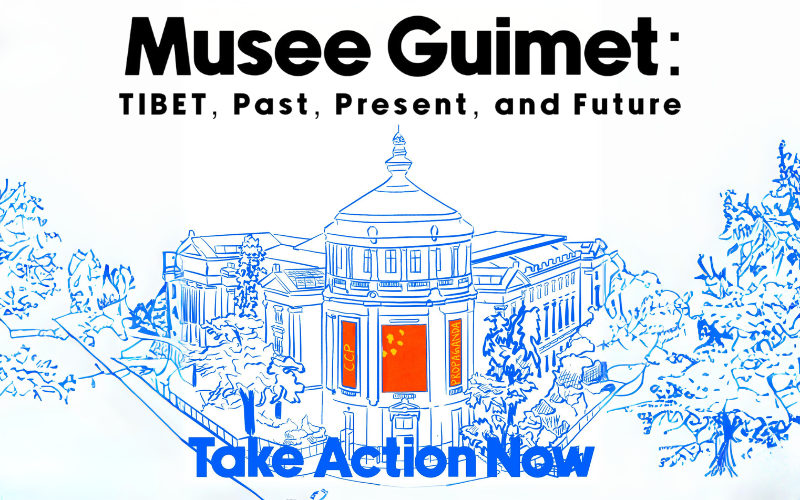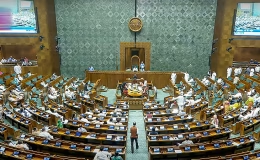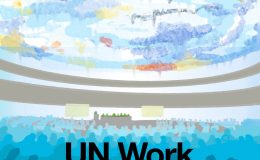FOR IMMEDIATE RELEASE
23 October, 2024
Over 140 global Tibet groups call on Musee Guimet to stop ‘endorsing China’s colonisation of Tibet’
[Paris] A top French museum in Paris is under fire for censoring the identity and cultural history of Tibet and endorsing China’s occupation of Tibet by rewriting history and replacing the word Tibet with ‘Himalayan World.’A global coalition of Tibet campaign groups today delivered a letter, signed by over 140 organisations [1], to Musée Guimet President Dr. Yannick Lintz in Paris urging the museum to correct its signage and use the ‘decolonised name Tibet.’
The campaigners confronted Musée Guimet’s support of China’s “systematic erasure” of Tibet and the deep, rich, and uniquely Tibetan cultural heritage urging the museum to “cease using the term “Himalayan World” in your exhibitions and change to the correct and decolonised name Tibet.”
Tibet was illegally invaded by China in 1950, and under the ongoing occupation, it is recognised by human rights organisations and experts to be one of the most repressive places in the world – Freedom House ranks Tibet as one of the least free places in the world in terms of civil liberties and political rights. [2] Seven decades of repression have resulted in the loss of all basic freedoms, and China continues to implement a system of cultural genocide making huge strides in the attempted erasure of Tibetans’ language, unique identity, and way of living.
Musée Guimet’s erasure of Tibet from its exhibitions has been replaced by the term “Himalayan World.” By not using the correct description of artifacts from Tibet, the museum is merging the distinct cultures represented in the exhibition into one and thus failing to represent the distinct histories of the countries included – Tibet, Bhutan, and Nepal.
Using Tibet to describe the wares in the exhibition is also important as it encapsulates the unique Tibetan culture and identity. By removing it, the Musee Guimet is accepting and supporting China’s seven decades of occupation and repression and ignores the legitimate struggles of the Tibetan people.
The International Council of Museums ‘Code of Ethics [3] – seen as an international minimum standard for museums – includes two key points concerning ‘interpretation’ and ‘publication’ of exhibitions. These points clearly state that museums should ensure information is “well-founded, accurate and gives appropriate consideration to represented groups or beliefs.” Musee Guimet is not currently a member of ICOM however the code of ethics is an internationally acclaimed “recognition of values shared by the international museum community.”
Rashi Jauhri of the International Tibet Network said: “Over 140 global Tibet groups and countless supporters are united in condemning Musée Guimet’s censorship of Tibet’s identity. This is not just a matter of semantics but a refusal on the part of the museum to acknowledge that Tibet is its own country with its rich cultural heritage. By prioritising China’s propaganda over historical accuracy, the museum is actively betraying every patron that walks through its door. Dr. Lintz must restore the name “Tibet” to all exhibitions immediately, or else continue to be complicit in China’s oppression of Tibetan peoples. ”
Tenzin Namgyal of Students for a Free Tibet France said: “What makes this situation even more disturbing is Ms. Yannick Lintz’s refusal to enter into dialogue with the Tibetan people, who are the first to be affected by this decision despite three letters sent by French-based groups including Students for a Free Tibet France. How can one claim to represent a culture while refusing to hear the voice of those who are its descendants?”
NOTES TO EDITORS:
- Joint Letter to Musee Guimet signed on by over 140 global Tibet organisations: https://tibetnetwork.org/musee-guimet-joint-letter-from-global-tibet-organisations
- Freedom House, Freedom in the World 2023, March 2023: https://freedomhouse.org/countries/freedom-world/scores
- The International Council of Museums (ICOM) is a globally renowned museum association that establishes professional and ethical standards for museum activities. ICOM makes recommendations on issues related to cultural heritage. The Code of Ethics is followed by international museums: see https://icom.museum/wp-content/uploads/2018/07/ICOM-code-En-web.pdf






Leave a Comment